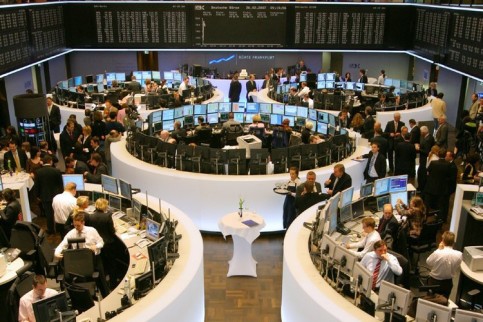|
 |


 |
Going Public on Frankfurt
The Frankfurt Stock Exchange (“FSE”) is one of the world’s leading international stock exchanges by revenue,
profitability and market capitalization, offering excellent services and systems for listed companies and investors.
It is owned and operated by Deutsche Börse AG.
|
Market Segments
FSE comprises two basic market segments – the Open Market (Freiverkehr) and the Regulated Market (Regulierter Markt).
First Quotation Board
On 3 February 2012, the Deutsche Boerse
Group took the decission to close The First Quotation Board (FQB) segment
of the Frankfurt Stock Exchange. It will not be reopened again for new
admissions. The Entry Standard segment will now be the first level of three
total segments on the Frankfurt Stock Exchange..
Open Market – Entry Standard
The Entry Standard provides for a minimal
set of requirements. There are few restrictions as to the jurisdictions of
incorporation an issuer may derive from. Although not required a prospectus
is strongly advised for a successful Entry Standard placement. In case of a
private placement (no public offerering), the minimum requirements an issuer
data form (very basic data as to the issuer). Contrary to the prospectus,
an issuer data form does not have to be approved by BaFin.
-
Minimum 1 year age of company
- No minimum issuing volume requirements
- Free-float requirement (at least 30 initial shareholders)
- Audited financials (National GAAP or IAS/IFRS US-GAAP, et. al.) for the year prior to the listing
- Minimum
share capital of 500,000 Euro The post-listing obligations are
substantially lower compared to the General and PrimeStandard such as:
- Facts which may materially affect the market price of the issuer’s securities
- Audited consolidated financial statements not later than six
- Months after the end of the reporting period (annual report)
- Interim reports within 3 months of the end of the first half of the financial year
- An annually updated profile of the issuer
- An up-to-date corporate calendar
Regulated Market – General and Prime Standard
The General and Prime Standard provide for a greater level of transparency
and set forth higher listing requirements for the issuer, in particular:
- Minimum 3 years of corporate existence
- Minimal
prospective market value of the securities to be admitted no less than
1,250,000 Euro (at least 10,000 (underlying shares)
- Requirement of a
minimum “free-float” of 25% of the outstanding securities.
-
Minimum 3 years of reporting history (i. e. publication of audited financial
statements)
The post-listing requirements of the General Standard are much
broader compared to the Entry Standard and relate in particular to the
issuer’s compliance with several obligations and reporting
requirements, such as:
- Publication of its annual accounts (not later than 4 months after the financial year end)
- Publication of half-yearly financial reports
- Disclosure of directors' dealings
- Ad-hoc disclosure
- Notification of shareholdings
In
connection with Depositary Receipt Programmes for third country
issuers, certain exemptions from the 4 months (annual reports) and 2
months (half-yearly financial reports) are available.
The listing in the Prime Standard implies additional post-listing
requirements, which are aimed at a greater transparency of the issuers,
including:
- Publication of quarterly reports
- Annual publication of a calendar regarding major corporate events
- Holding at least one analyst presentation per year
Main steps for the listing
The procedure for listing on the FSE comprises the following main steps:
Completion of a Due Diligence investigation (legal, financial, business)
Drafting of the Prospectus – issuer data form
Receipt of the BaFin approval regarding the Prospectus (if any).
Set-up of a DR (Depositary Receipts) programme (if any)
Underwriting and offering (if any)
Admission to listing/inclusion to trading from FSE
Commencement of trading
A listing on a European exchange
provides
access to millions of international investors that shy away from the
higher American broker fees. The European markets are appealing for
going public, the Frankfurt Exchange ranks third in terms of volume,
behind New York and NASDAQ. Europe has a most attractive investor pool.
In 2011 Deutsche Börse bought 60% of the NYSE. The European regulations
are more relaxed, and there are no monthly or annual filing fees.
Because there are tax advantages in Europe for holding on to a stock
for a particular period of time, European investors hold on to their
stocks for a longer term than American. This result in more stabile
stock prices. for instance German investors get a tax break for stocks
held over one year, to encourages retention of stocks, and causing less
day trading. Frankfurt has a higher turnover velocity than the London
exchange, and is third in terms of sheer volume, just behind New York
and NASDAQ.
Time for an FSE Listing (IPO)
Estimated Time to Listing: Approximately 8 to 24 weeks.
In
conclusion Frankfurt, Stockholm and Stuttgart offers less cost, better
liquidity, and greater access to capital. Call us today to discus a
listing of your company.
Call Now 1 416 444-4001, 1 313
918
1320, +46 40 644 4636
|

